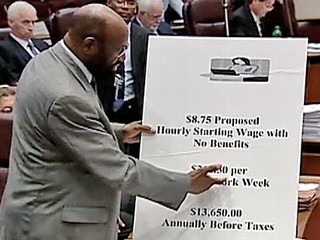by ALICE GOMSTYN
ABC NEWS Business Unit
July 2, 2010
Walmart Executive-Worker Pay Gap Strikes Chord in Chicago and Beyond
By Ed Smith's math, the CEO of Walmart earns more in an hour than his employees will earn in a year.

ABC News
Chicago alderman Ed Smith has calculated that Walmart CEO Michael Duke earns more in an hour than his employees will earn in a year. Smith's numbers may be a bit off, according to an executive compensation firm, but he argues that there's still a "sad" contrast between the tens in millions of dollars Duke receives and the wages of his employees.
Smith, an alderman in Chicago, presented posters at a city council meeting showing that Walmart CEO Michael Duke's $35 million salary, when converted to an hourly wage, worked out to $16,826.92. By comparison, at a Walmart store planned for the Windy City's Pullman neighborhood, new employees to be paid $8.75 an hour would gross $13,650 a year.
Smith's numbers could be a bit off. Equilar, an executive compensation research firm, calculates that Duke earned just south of $20 million in 2009 and $28 million in 2008, not counting millions of dollars in potential performance awards. But the alderman argued that there's still a "sad" contrast between Duke's compensation and the wages of his employees.
"How can you go to bed at night and sleep knowing you make this kind of money and the people working for you can hardly buy a package of beans and rice?" he asked in an interview with ABCNews.com.
Walmart, meanwhile, said that its wages across the country are competitive in local markets and that on average, hourly employee pay -- which includes more experienced workers but not managers -- ranges from $10 to more than $12.
The retail giant made no apologies for Duke's salary.
"I don't think Mike Duke needs, as the CEO of a Fortune 1 company, needs me to defend his compensation package," said Walmart director of community affairs Steven Restivo, referring to Walmart's status as the largest company on the planet.
The debate over Walmart wages has been a thorny local issue in Chicago, where city aldermen on Wednesday reluctantly approved plans for a new Walmart store. It also speaks to continued concerns nationwide over the pay gap between top executives and their rank-and-file employees.
A study last fall by the Institute for Policy Studies, a liberal Washington D.C. research group, found that CEOs in the country's S&P 500 companies make, on average, 319 times more than the average American worker.
IPS associate fellow Sam Pizzigati said that in the 1970s, that ratio was 30 to 1.
"We've seen, over the past three decades, a tenfold-plus increase in the gap between top executives and average American workers," Pizzigati said. "That Chicago alderman is putting his finger on a very real problem in American economic life."
Why the Pay Gap Has Grown
Pizzigati said the reasons for the yawning gap are two-fold. Declining top-bracket tax rates over the last half-century, he said, took away a strong disincentive for company boards to keep a lid on CEO pay.
The top marginal tax rate, he said, dropped from 91 percent in the 1960s to 28 percent in 1980s. It stands at 35 percent today.
"If you look at historical record, executive pay really started exploding in early 1980s," he said. "That's when the top rate started precipitously falling."
On the worker side, Pizzigati said, wages have been hurt by the declining power of U.S. organized labor. When it represented more than one-third of the American workforce, unions could influence wages -- and force them higher -- throughout the labor market. With just seven percent of Americans represented by unions today, Pizzigati said, that's no longer the case.
Paul Hodgson, a senior research associate at the executive compensation watchdog group The Corporate Library, attributed the gap to another factor: the use of stock awards in CEO pay. Notwithstanding the recent financial crisis, stocks have seen tremendous gains since the 1980s and that, he said, has been reflected in CEO compensation.
As a result, he said, "CEO pay has been growing exponentially while everyone else's wages have been growing arithmetically."
Companies that shell out blockbuster salaries and benefits maintain that high compensation is necessary to attract the best talent to top positions.
In Chicago, in recent years the compensation issue has centered largely on so-called big box stores like Walmart. In 2006, the city's mayor vetoed a resolution by the city council to raise minimum hourly pay by giant retailers in the city to $10 plus $3 worth of benefits.
Chicago Labor Leaders Wanted Higher Pay at Walmart
This week's approval of the new Walmart store came despite demands by labor organizers that Walmart, a non-union company, should pay at least $11 an hour to new employees. Walmart countered that the $8.75 it plans to pay -- which is 50 cents above Chicago's minimum wage -- is more than the starting hourly wages of unionized grocery store workers in the area.
An organizer for Local 881 United Food and Commercial Workers declined to comment on wages for union members, citing ongoing contract negotiations, but said that, overall, members receive better health insurance and retirement benefits than Walmart employees. (In its defense, Walmart said its health insurance plans offer "a wide range of options" and trumpeted its 401k and profit sharing plans.)
Smith said he ultimately decided to join his fellow aldermen in unanimously voting to allow the Pullman store because of the jobs the store is expected to create and its addition to the city's tax base.
He, too, would have liked to see the retailer pay at least $11 an hour to new employees, but added that he's glad Walmart's $8.75 starting pay is above minimum wage.
"As Kenny Rogers says, 'You gotta know when to hold them and know when to fold 'em,'" Smith said. "So that's what we did."
http://abcnews.go.com/Business/walmart-ceo-pay-hour-workers-year/story?id=11067470




